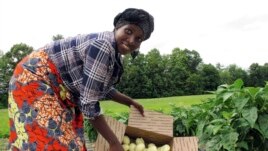19 August, 2018
Janine Ndagijimana's parents came from Burundi. But she was born in a refugee camp in Rwanda, a neighboring country. In 1994, her family fled Rwanda at the start of the genocide and settled at another refugee camp in Tanzania.
Ndagijimana arrived in the United States in 2007. She settled in the northeastern state of Vermont and began to dream of farming. While deciding what to plant, she thought back to her time in Tanzania.
It was at the refugee camp that she considered growing African eggplants, known as "intore," in her native Kirundi language. She bought vegetables from farmers and sold them at the refugee markets. She saw that growers of African eggplant were making a lot of money, but she did not have the land to grow the fruit herself.

Janine Ndagijimana displays African eggplant also called bitter ball or garden egg, harvested from her field in Colchester, Vermont.
Ndagijimana remembered how a person would receive just 3.6 kilograms of food, which was usually only corn and beans, to eat for two weeks.
"Life was not easy because even the food they provided was not enough for one person," she said.
To support her family
Vermont is one of the least culturally or racially diverse states in the U.S. Its population is 95 percent white.
In Vermont, she was able to use about 0.4 hectares of community garden. Later, a farmer leased her another 0.8 hectares for free.
"This is to support the family," she said. She hopes that when the business gets bigger she can use the money she makes to send her children to college.
Since Ndagijimana planted her first crop in 2013, she has sold her 2,270-kilogram harvest through the mail to Africans in Arizona, Texas, Utah, Michigan and Idaho.
She is part of a growing number of farmers who have successfully used social media and the internet to sell crops from their home countries in the U.S.
The U.S. Committee for Refugees and Immigrants said that other refugee communities also are growing and selling native crops around the U.S. For example, Burmese and Bhutanese farmers are raising and selling eggplants, peppers and herbs in Lowell, Massachusetts. In Dearborn, Michigan, Syrian and Iraqi refugees are growing peppers and mint.
Expanding her business
Ndagijimana hopes to eventually farm on 4.1 hectares. She has received help from a program called New Farms for New Americans. The program receives support from the U.S. Department of Agriculture and the University of Vermont, or UVM.
Ben Waterman, of the UVM Center for Sustainable Agriculture meets with her weekly. He said she has also been teaching people how to copy her business model.
"Janine does her research and she really kind of weighs her options and makes use of a lot of the resources around here," Waterman said.
I'm Phil Dierking.
This story was originally reported by Lisa Rathke for the Associated Press. Phil Dierking adapted this story for VOA Learning English. Hai Do was the editor.
Do you have any crops from your home country you think would be popular in the United States? Write to us in the Comments Section or on 51VOA.COM.
______________________________________________________________
Words in This Story
bean - n. a seed that is eaten as a vegetable and that comes from any one of many different kinds of climbing plants
corn - n. a tall plant that produces yellow seeds (called kernels) that are eaten as a vegetable, used to produce many food products, and used as food for animals
herb - n. a plant or a part of a plant that is used as medicine or to give flavor to food
lease - v. to allow someone to use (something) for a period of time in return for payment
mint - n. an herb that has a strong pleasant smell and taste and that is used in medicine and food
pepper - n. a food seasoning that is made by grinding the dried berries of an Indian plant along with their hard, black covers
plot - n. an area of land that has been measured and is considered as a unit
word-of-mouth - phrase. spoken language; informal or unofficial discourse.